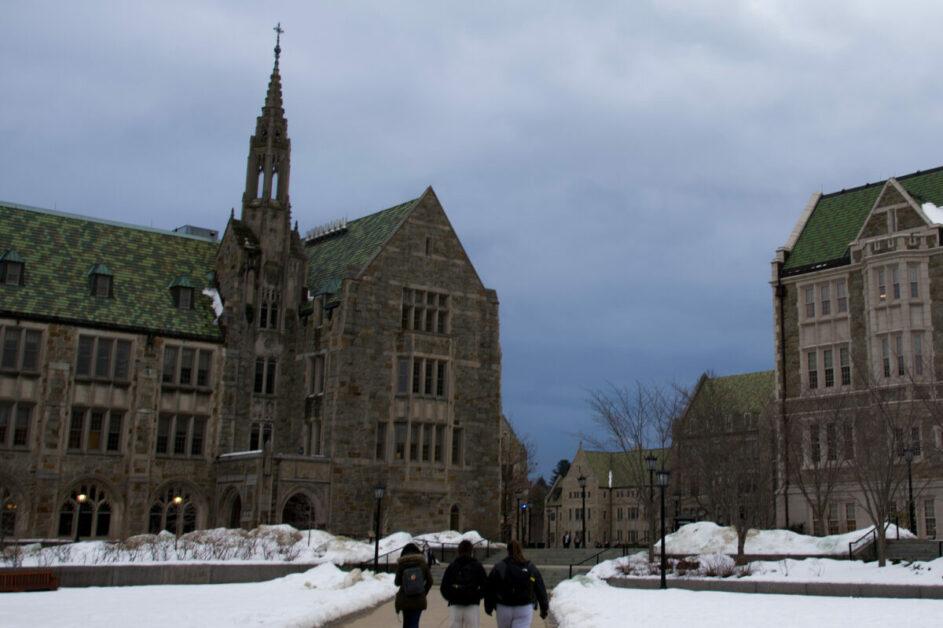The Student Assembly (SA) of the Undergraduate Government of Boston College passed a resolution calling for the creation of a Division of Environmental Sustainability within UGBC on Tuesday.
“By introducing this division, we are showing UGBC’s commitment to prioritizing, once and for all, climate and sustainability and … our commitment to sustainability efforts on this campus and beyond,” Julia Spagnola, sponsor of the resolution and MCAS ’23, said.
The resolution removes environment and sustainability from under the Student Initiatives (SI) branch of UGBC, making it its own division.
Spagnola spoke to the limitations imposed by the current placement of sustainability initiatives under SI, which centers around programming efforts rather than policy.
“Although programming is a big part of climate and sustainability, we’re also under the belief that policy making is a huge aspect and making some real change on our campus and potentially moving towards that goal of divestment,” she said.
The division will ideally have a budget of $10,000 to $15,000, a significant increase from what is currently available within SI, according to Jack Bracher, president-elect of UGBC and MCAS ’22.
This budget will also allow for the expansion of initiatives proposed by other environmental groups on campus—such as the transition to electric buses—that are working with limited budgets, Spagnola said.
The division will bring together a coalition of existing student activist groups on campus, including Eco Pledge, Real Food BC, and Sea Eagles, according to Spagnola. The division head will meet with representatives from these groups to confer, share ideas, and brainstorm different policies.
Another unique aspect of the division, Spagnola said, is the inclusion of an environmental volunteer corps that will call upon students and student leaders to carry out service initiatives in the community, such as on-campus composting and Reservoir cleanups.
“An environmental and sustainability division would not just strengthen programming, but it would ensure students have the resources and the platform to truly empower the campus narrative, and change the circumstances of sustainability on campus altogether,” Ryan Bates, sustainability and environmental coordinator of SI and MCAS ’22, said.
Many representatives in support of the resolution acknowledged the wide student interest in climate advocacy on campus, citing a nonbinding UGBC referendum from 2019 in which 2,005 students voted in support of BC withholding investments in the fossil fuel industry.
Some representatives who disagreed with the proposal voiced their concerns about budget allocation, and advocated for fixing fundamental issues within SI rather than removing certain aspects of it.
“It’s not a structural issue,” Laura Perrault, SA representative and MCAS ’21, said. “[SI has] had success with environment and sustainability in the past.”
Jordan Nakash, SA representative and MCAS ’24, responded to a point made about the number of students who had sent emails to their representatives advocating for the passage of the resolution.
“They don’t understand,” Nakash said. “I mean maybe some of them do, but they want more advocacy, they’re not saying, ‘I want a division.’ They want us to get the work done, and there’s ways to do that without completely changing the structure of UGBC.”
When the meeting opened the floor to the public—around two and a half hours in—many students in attendance took the opportunity to vocalize their frustration with the way the debate of the resolution had been handled so far.
“I am appalled by some of the comments that were made earlier in the debate,” Teddy Bobroske, a member of Climate Justice at Boston College (CJBC) and MCAS ’23, said. “You saw firsthand how strongly we feel about this … and to dismiss that as not being educated on a relatively opaque part of the student government, I’m frankly deeply, deeply disappointed….”
Other students criticized the bureaucratic red tape within UGBC that stands in the way of making change.
“To achieve intersectionality and intersectional change just means that you can push forward one initiative without cutting back on another one,” Adin Henderson, a member of the Schiller Institute’s Confronting Environmental Racism Planning Committee and MCAS ’21, said. “And so you can pursue environmental justice and that really doesn’t say anything about any other initiatives that are happening.”
Nineteen representatives voted in favor of the resolution, two voted against it, and seven abstained.
“Clearly there’s a disconnect between people advocating for these things and UGBC,” Kyle Rosenthal, a member of CJBC and CSOM ’21, said. “I think that the incoming administration believes [the resolution] is one solution to that. I hope that everyone who voted against it but said they still want to see stuff get done actually goes and gets those things done.”
Featured Image by Nicole Vagra / For The Heights







